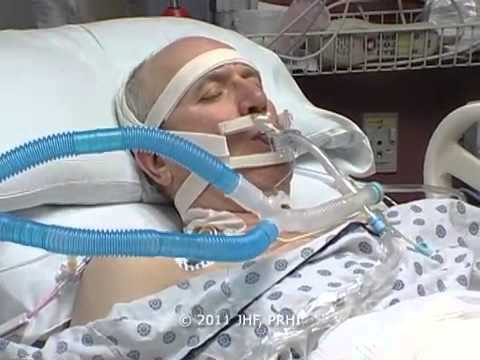I credit my friend, Frank Llosa from KetoneAid for the following, potentially critical information.
It constitutes a critical consideration often not thought about in the context of critical care.
Any person put on a ventilator is automatically fed through feeding tube. The default source of nourishment?
“ENSURE”.
Why is this a problem?
For starters, Ensure uses quite literally the poorest quality and most health-compromising ingredients of virtually any meal replacement on the market (soy protein isolate, GMO soybean and corn oil, corn maltodextrin–extremely high glycemic content, and also a source of GMO’s and pesticides, and potentially trace gluten residues). Also, the listed vitamins and minerals on the product are of the poorest (read: cheapest) available quality and worst bioavailability. In my in-depth supplement module of my Primal Restoration program I evaluate the safety of common nutrients sourced for cheap (and even sometimes expensive) nutritional products, and I enumerate the many concerns and potentially adverse health effects associated with inferior nutrient sourcing.
But under the current circumstances related to infectious disease, here is potentially the most important consideration of all, especially for those receiving this product while on a ventilator for this or any other infectious disease crisis:
Sugar is one of the major—if not the main ingredient in a bottle of Ensure, second only to water. In fact, an 8-ounce serving of Ensure contains between 18 and 23 grams of sugar, depending on the flavor. That translates to between 4.5 and 5.75 teaspoons of added sugar per serving. These amounts come shockingly close to the (even excessively liberal estimate of) daily 6-teaspoon sugar limit for women and the daily 9-teaspoon limit for men recommended by the American Heart Association.
One of the co-morbidities associated with the poorest outcomes in any form of pneumonia includes metabolic conditions in general, and diabetes in particular. There is a good reason for that:
According to this research study [Ringsdorf WM jr, Cheraskin E and Ramsey RR jr. Sucrose, Neutrophilic Phagocytosis, and Resistance to Disease. Dent Surv 1976; 52 (12): 46-48], which I cited in my first book, Primal body, Primal Mind, a high carbohydrate meal (and resulting elevated blood sugar) results in the average person losing more than 90% of their leukocytic index (i.e.,immune function) within 15 minutes of consuming sugar/refined carbohydrate in any form. An effect that may be sustained for “at least 5 hours”, according to yet another, similar research paper.
https://academic.oup.com/ajcn/article-abstract/26/11/1180/4732762

NOTE: It is not clear as to what form of starch was used in the above data. It is well-known that a baked potato or cup of cereal can spike your blood sugar faster than a candy bar. But in any case, even though the starch data above showed “less of” a compromise to the leukocytic index in this study, it did show compromise. Any form of immune compromise is a potential impediment to recovery.
The neutrophils that we rely on to kill any invading bacteria and viruses form 60% – 70% of the white blood cells in our bodies. They are generally much more active than any other blood cell. It can be disastrous to our existing health, therefore, if their effectiveness is compromised in any way. But this is exactly what happens if we eat too much carbohydrate and too much sugar in particular. Multiply this concern exponentially for anyone already immune compromised!
Ensure is a SUGAR BOMB.
We need to ask ourselves if the form of nutrition being administered during the use of respirators for this condition, and for others in critical care for immune-related conditions may be complicating outcomes and–at the very least– prolonging recovery.
So what is the alternative?
We simply cannot expect a hospital ICU to provide things like bone broth and whatever else that might actually supply a critical patient with real nutrition. Realistically, this is not going to happen–as tragically–and even criminally absurd as that might be.
There is a product made by Abbott Laboratories that goes by the name of ‘Glucerna’. It was formulated for meal replacement use in diabetics. It is extremely conventional in it’s formulation, meaning that it is likely available in most hospital settings. Mind you, the ingredient profile is a total horrifyingly toxic concoction–and pretty much on par with Ensure. BUT… Where it is automatically preferable to Ensure is in its very low sugar content.
Frank tells me that where some he knows have fought for this alternative with their loved ones, ventilator time was significantly reduced from average and recovery was significantly faster.
Purely anecdotal, I know… But this anecdote is consistent with what is known through legitimate peer-reviewed research about the effects of any sugar upon on immune function.
Hopefully the very temporary reliance upon highly toxic and grotesquely inferior commercial meal replacements can be at least somewhat compensated for following recovery. But the real priority here, under the circumstances, should be recovery first.
I want to be clear that I am not endorsing Glucerna as a nutritious or remotely healthy alternative to Ensure in the least. It is only worthy of consideration for it’s very low sugar content and its likely broad availability in a hospital setting.
Pass this on to anyone you know who may have a loved one currently on a respirator. The alternative here is well worth fighting for.
Once home, avoid any meal replacement product like this like the plague and return the patient to real nutrition ASAP!!!

